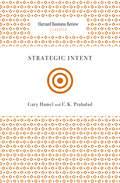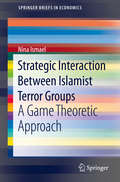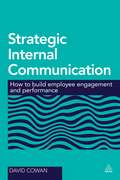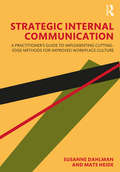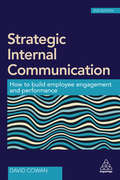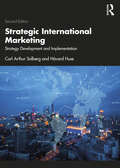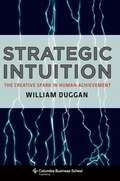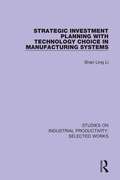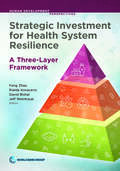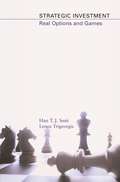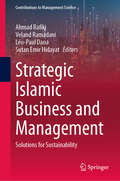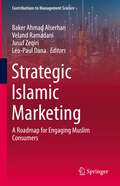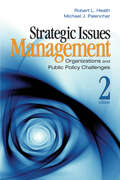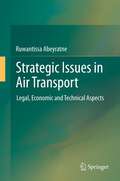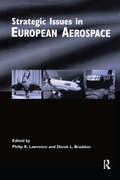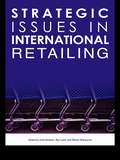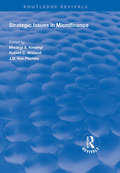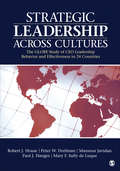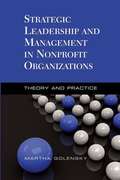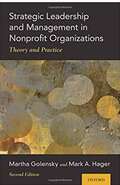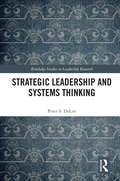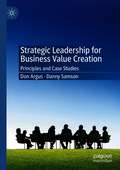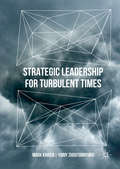- Table View
- List View
Strategic Intent (Harvard Business Review Classics)
by Gary Hamel C. K. PrahaladIn this McKinsey Award-winning article, first published in May 1989, Gary Hamel and C. K. Prahalad explain that Western companies have wasted too much time and energy replicating the cost and quality advantages their global competitors already experience. Canon and other world-class competitors have taken a different approach to strategy: one of strategic intent. They begin with a goal that exceeds the company's present grasp and existing resources: "Beat Xerox"; "encircle Caterpillar. " Then they rally the organization to close the gap by setting challenges that focus employees' efforts in the near to medium term: "Build a personal copier to sell for $1,000"; "cut product development time by 75%. " Year after year, they emphasize competitive innovation--building a portfolio of competitive advantages; searching markets for "loose bricks" that rivals have left underdefended; changing the terms of competitive engagement to avoid playing by the leader's rules. The result is a global leadership position and an approach to competition that has reduced larger, stronger Western rivals to playing an endless game of catch-up.
Strategic Interaction Between Islamist Terror Groups: A Game Theoretic Approach (SpringerBriefs in Economics)
by Nina IsmaelThis book applies game theory to the phenomenon of terrorism and investigates how the competition for support can influence the attack behavior of terror organizations. In addition, it examines the economics of terrorism. The so-called outbidding theory, which has become increasingly popular within the field of terrorism research, argues that terror groups vying for resources will engage in more and more violence to demonstrate their capabilities and commitment to their cause. This book challenges the outbidding concept by providing a game-theoretical analysis, which shows that a contest between two terror groups can be interpreted as a race for support. This interpretation may help explain why major attacks occur at all: not as a result of outbidding, but as a result of losing the race. In addition, the author shows that rivalry between terror groups does not necessarily lead to more attacks, but can result in less terrorism due to an increased probability of attack failure induced by the race. Lastly, the model is applied to the rivalry between al-Qaeda and Daesh, elaborated on with empirical evidence. Given its scope, the book is a must read for researches and scholars working in the fields of economics, politics, the social sciences, and military history, as well as military and political decision-makers and authorities working in the field of risk management.
Strategic Interactions between an Independent Central Bank and a Myopic Government with Government Debt
by Sven Jari Stehn David VinesA report from the International Monetary Fund.
Strategic Internal Communication
by David CowanEffective internal communications is a much neglected area in the world of business. While most organizations recognize that the external communication between customers and shareholders is crucial to the success of a business, very few consider the implications of their internal communication or develop a clear strategy for it. So while management decisions may be perfectly rational, badly executed communication can leave staff across the organization confused, worried or disinterested. Strategic Internal Communication offers a complete approach to building engagement, performance and cultural integration in any organization. It looks at the relation between the traditional silos of internal communication, HR and employee engagement and demonstrates, using the new Dialogue Box approach, how to use communication more effectively and strategically to break down these barriers.
Strategic Internal Communication: A Practitioner’s Guide to Implementing Cutting-Edge Methods for Improved Workplace Culture
by Mats Heide Susanne DahlmanWhat is internal communication? What role does it play in contemporary organizations? What are the consequences of malfunctioning internal communication? There are many aspects of internal communication – work related, social, formal, informal, vertical, horizontal, between coworkers, between coworkers and managers, communication before and under organizational changes, internal crisis communications and so forth. We think of different forms of communication channels such as intranet, staff magazines, electronic billboards and internal television. This book interconnects these different parts and emphasizes the strategic value and importance of internal communication. We understand internal communication as an unused capital with a large potential for organizational success. Further, we understand internal communication as a basic prerequisite of organizations that is performed by all members of an organization – managers, coworkers and communication professionals. Traditionally, there has been too much emphasis on the work and function of communication professionals when internal communication is discussed, but most of the communication value is actually produced by managers and coworkers. However, communication professionals are the communication experts in organizations that strategically facilitate the organization. This book is based on a cooperation between Susanne Dahlman, senior communication consultant, and Mats Heide, Professor in Strategic Communication at Lund University. Hence, this book has a unique approach that covers both practical and academic aspects of internal communication. This book is a response to the demand for a book that covers the strategic aspects of internal communication in practice, and as such is ideal reading for both practitioners and advanced students.
Strategic Internal Communication: How to Build Employee Engagement and Performance
by Dr David CowanPreviously restricted to cascading information and managing day-to-day conversations, internal communication is now essential to empowering employees to deliver business strategy. Strategic Internal Communication shows how to design and implement a strategy which will lead to engaged and motivated staff, increased productivity and consequently improved business performance. The book uses the author's own Dialogue Box tool designed to help companies explore more thoroughly what kinds of conversations they need to have with employees to address internal and cultural challenges. It helps transform organizations into open and transparent communities to ensure that entire workforces are committed to the overall business vision.This fully updated 2nd edition of Strategic Internal Communication includes new information on how to use Dialogue Box during times of transition and organizational change. It also gives advice on how to manage difficult conversations and avoid damaging miscommunication and misinterpretation. Supported by examples and case studies from the author's own experience, Strategic Internal Communication is an indispensable guide to creating an integrated and collaborative culture which will take your organization to the next level of success.
Strategic International Marketing: Strategy Development and Implementation
by Carl Arthur Solberg Håvard HuseStrategic International Marketing, 2e offers a uniquely adaptable strategy framework for firms of all sizes that are looking to internationalise their business, using Carl Arthur Solberg's tried and tested Nine Strategic Windows model.Compact and readable, this practical text offers the reader insights into the globalisation phenomenon, partner relations and strategic positioning in international markets. This 2nd edition has been fully updated to include coverage of the complex international business environment, consider how technological development has shaped buyer behaviour, channels of distribution and payments systems globally, and the impact of digitalisation on the global economy more broadly. New international case studies and examples are included throughout to demonstrate how the theory translated into practice.This text is strategic and applied, and an ideal introduction to international marketing for advanced undergraduates and postgraduates in Business and Management, as well as those studying for MBAs and executive qualifications. It also offers a pragmatic toolkit for managers and marketers that are seeking to expand their business into new territories. Supplementary online resources are available to aid instructors.
Strategic Intuition: The Creative Spark in Human Achievement (Columbia Business School Publishing Ser.)
by William DugganHow "Aha!" really happens.When do you get your best ideas? You probably answer "At night," or "In the shower," or "Stuck in traffic." You get a flash of insight. Things come together in your mind. You connect the dots. You say to yourself, "Aha! I see what to do." Brain science now reveals how these flashes of insight happen. It's a special form of intuition. We call it strategic intuition, because it gives you an idea for action-a strategy. Brain science tells us there are three kinds of intuition: ordinary, expert, and strategic. Ordinary intuition is just a feeling, a gut instinct. Expert intuition is snap judgments, when you instantly recognize something familiar, the way a tennis pro knows where the ball will go from the arc and speed of the opponent's racket. (Malcolm Gladwell wrote about this kind of intuition in Blink.) The third kind, strategic intuition, is not a vague feeling, like ordinary intuition. Strategic intuition is a clear thought. And it's not fast, like expert intuition. It's slow. That flash of insight you had last night might solve a problem that's been on your mind for a month. And it doesn't happen in familiar situations, like a tennis match. Strategic intuition works in new situations. That's when you need it most. Everyone knows you need creative thinking, or entrepreneurial thinking, or innovative thinking, or strategic thinking to succeed in the modern world. All these kinds of thinking happen through flashes of insight-strategic intuition. And now that we know how it works, you can learn to do it better. That's what this book is about. Over the past ten years, William Duggan has conducted pioneering research on strategic intuition and for the past three years has taught a popular course at Columbia Business School on the subject. He now gives us this eye-opening book that shows how strategic intuition lies at the heart of great achievements throughout human history: the scientific and computer revolutions, women's suffrage, the civil rights movement, modern art, microfinance in poor countries, and more. Considering the achievements of people and organizations, from Bill Gates to Google, Copernicus to Martin Luther King, Picasso to Patton, you'll never think the same way about strategy again.Three kinds of strategic ideas apply to human achievement:* Strategic analysis, where you study the situation you face* Strategic intuition, where you get a creative idea for what to do * Strategic planning, where you work out the details of how to do it.There is no shortage of books about strategic analysis and strategic planning. This new book by William Duggan is the first full treatment of strategic intuition. It's the missing piece of the strategy puzzle that makes essential reading for anyone interested in achieving more in any field of human endeavor.
Strategic Investment Planning with Technology Choice in Manufacturing Systems (Studies on Industrial Productivity: Selected Works #4)
by Shan Ling LiOriginally published in 1994 this book examines problems related to investment planning, capacity additions, and choice of technology in dynamic manufacturing systems characterized by multiple products, dynamic demand growth, uncertainty in demand and availability of alternative technologies. A model-based methodology is developed that focuses on trade-offs between flexible and conventional technology. The research conducted for this book is directed to the development of tools to support investment decisions in production capacity over medium and long-term planning horizons.
Strategic Investment for Health System Resilience: A Three-Layer Framework (Human Development Perspectives)
by Feng Zhao David Bishai Jeff Weintraub Rialda KovacevicAs efforts to build emergency-ready health systems intensify across the globe, Strategic Investment for Health System Resilience: A Three-Layer Framework provides a practical investment framework and a diverse set of country cases to inform decision-making and strategic resource allocations. The framework includes layer 1, risk reduction—promoting emergency-ready primary health care, public health, prevention, and community preparedness; layer 2, detection, containment, and mitigation capabilities; and layer 3, advanced case management and surge response. This three-layer framework prioritizes interventions that prevent a public health threat from developing in the first place (layer 1), limit its spread should one emerge (layer 2), and manage a widespread crisis that compromises a health system’s ability to deliver care sustainably (layer 3). All three layers play a role in achieving health system resilience, but not all of them have been leveraged equally in the past. Strategic Investment for Health System Resilience offers a glimpse of the relatively low cost of investments in improving the operation of the weakest parts of the three layers. Layer 1 functions are estimated to cost between US$2 per capita in low-income countries and US$4 per capita in lower-middle-income countries. The framework applies equally to short-term epidemics of communicable diseases and to slow-moving trends in noncommunicable diseases. The pace of the needed response to health threats can vary, but all require a system that is resilient across multiple layers of response. Although there is no universal blueprint for every setting, it behooves all countries to seize the moment and invest in the three layers in ways that fit their needs.
Strategic Investment: Real Options and Games
by Lenos Trigeorgis Han T. SmitCorporate finance and corporate strategy have long been seen as different sides of the same coin. Though both focus on the same broad problem, investment decision-making, the gap between the two sides--and between theory and practice--remains embarrassingly large. This book synthesizes cutting-edge developments in corporate finance and related fields--in particular, real options and game theory--to help bridge this gap. In clear, straightforward exposition and through numerous examples and applications from various industries, Han Smit and Lenos Trigeorgis set forth an extended valuation framework for competitive strategies. The book follows a problem-solving approach that synthesizes ideas from game theory, real options, and strategy. Thinking in terms of options-games can help managers address questions such as: When is it best to invest early to preempt competitive entry, and when to wait? Should a firm compete in R&D or adopt an accommodating stance? How does one value growth options or infrastructure investments? The authors provide a wide range of valuation examples, such as acquisition strategies, R&D investment in high-tech sectors, joint research ventures, product introductions in consumer electronics, infrastructure, and oil exploration investment. Representing a major step beyond standard real options or strategy analysis, and extending the power of real options and strategic thinking in a rigorous fashion, Strategic Investment will be an indispensable guide and resource for corporate managers, MBA students, and academics alike.
Strategic Islamic Business and Management: Solutions for Sustainability (Contributions to Management Science)
by Sutan Emir Hidayat Léo-Paul Dana Veland Ramadani Ahmad RafikiIn the contemporary global market, this book underscores the significance of Islamic institutions and companies to employ effective business and management strategies for sustained success. It provides a thorough examination of diverse facets of Islamic business and finance, including organizational aspects, strategic planning, marketing, entrepreneurship, and innovation. Rooted in the principles of Islamic religious law, the text presents a range of concepts, models, and frameworks to enhance the performance of Islamic organizations. From historical insights to contemporary adaptations, the book highlights the crucial role of a just system in ensuring sustainability within the banking sector and broader business context. The emphasis on ethical practices, stakeholder considerations, and technology integration advocates for strategic approaches that enhance competitiveness while adhering to values of sustainability. With a specific focus on topics such as digital marketing, the book navigates the utilization of technology for optimized customer reach and campaign performance. A pertinent resource for entrepreneurs, practitioners, policymakers, academicians, and students interested in formulating effective strategies in Islamic business, management, and digital marketing to promote sustainability and ethical practices.
Strategic Islamic Marketing: A Roadmap for Engaging Muslim Consumers (Contributions to Management Science)
by Léo-Paul Dana Veland Ramadani Baker Ahmad Alserhan Jusuf ZeqiriMarketing in the emerging Islamic markets is a challenging business function since international companies must contend with unfamiliar customs, cultural differences, and legal challenges. This book provides marketers who want to reach this emerging and very lucrative consumer base with essential, research-based insights on these aspects and how to deal with them. This book redefines marketing practice and conduct and challenges conventional marketing wisdom by introducing a religious-based ethical framework to the practice of marketing. The framework opens a whole new array of marketing opportunities and describes the behavior of the consumer, community, and companies using a different approach than conventional marketing thought.
Strategic Issues Management: Organizations and Public Policy Challenges
by Robert L. Heath Michael J. PalencharStrategic Issues Management explores the strategic planning options that organizations can employ to address crucial public policy issues, engage in collaborative decision making, get the organization′s "house" in order, engage in tough defense and smart offense, and monitor opinion changes that affect public policy. In this fully updated Second Edition, authors Robert L. Heath and Michael J. Palenchar offer practical, actionable guidance that readers can apply to organizations from large Fortune 500 companies to nongovernmental organizations and start-up high tech companies. FeaturesIncludes a NEW chapter on brand equity, updated examples, theories and cases throughout, new information on activists and activism, and increased attention to the role that technology plays in issues managementExplores ways public relations, risk communication, and crisis communication can be used to address crucial public policy options Advises managers on ways to lessen the chance of a crisis becoming an issue through an examination of crisis preparation and responsesAddresses the topic of reputation management by exploring the connection between issues management and brand equity using examples from McDonald′s and Wal-Mart Challenges managers to engage in collaborative decision making with community leaders and residents to reduce the chance that undue fear will translate into unnecessary regulation or legislationOpens each chapter with case study vignettes and closes with summary questions and issues management challenges Strategic Issues Management is appropriate for courses in Corporate/Strategic Communications, Public Relations Management, Crisis/Risk Communication, Strategic Management, Public Relations Management, Organizational Communication, and Public Policy and Administration.
Strategic Issues in Air Transport: Legal, Economic and Technical Aspects
by Ruwantissa AbeyratneThere are broadly four strategic issues in aviation: safety; security; environmental protection; and sustainability in air transport. These issues will remain for a long time as key considerations in the safe, regular, efficient and economic development of air transport. Within these four broad categories come numerous subjects that require attention of the aviation industry as well as the States. In six chapters, this book engages in detailed discussions on these subjects as they unravelled in events of recent years. The issue of safety is addressed first, following an introduction of the regulatory regime covering the four issues. Within the area of safety, the book covers such areas as safety management systems, safety and aeromedicine, safety and meteorology, the use of airspace, unmanned aircraft systems and safety oversight audits. In the security area, subjects covered include cyber terrorism, the integrity of travel documents, full body scanners, civil unrest and aviation, the suppression of unlawful acts on board aircraft and the financing of terrorism. The chapter on the environment focuses mainly on climate change - particularly on carbon credits, market based measures, the carbon market and emissions trading schemes and their effect on air transport. Finally, the chapter on sustainability discusses in detail market access along with such issues as slot allocation, open skies, the use of alternative fuels as an economic measure and corporate foresight. The concluding chapter wraps up with a discussion on where air transport is headed.
Strategic Issues in Distribution
by Hirotaka TakeuchiProvides students with an in-depth understanding of the channel decision from the manufacturer's point of view. The two issues addressed in the note are selection of channel design and channel management.
Strategic Issues in European Aerospace
by Derek Braddon Philip LawrenceThis book is a unique collection of perspectives provided by a mix of leading academics, industrialists and government officials on the challenges facing the European aerospace industry. The book focuses on two interrelated, daunting challenges. The consolidated American aerospace industry, which in the 1990s has undergone $100bn worth of merger activity. The second is the compelling task of rationalization and consolidation required in the European industry itself. Through a mix of analytical perspectives and project-oriented assessments, the book provides an essential guide to the major strategic agenda for the European industry. A unique feature is the contribution of leading industry executives and project managers. These industry insiders outline the dilemmas and challenges facing the industry from the viewpoint of those at the sharp end of the business. The book is an essential guide to the technical, political and economic agenda for aerospace in the next decade and beyond.
Strategic Issues in International Retailing
by John Dawson Roy Larke Masao MukoyamaThis important text takes a strategic approach, examining in-depth studies of a variety of retailers and marrying theory with practice to provide comprehensive coverage for students at every level. Illustrating and evaluating the strategies of international retailers, developing concepts and theories that enable an understanding of international retailing and showing the contrasts in the approaches adopted by major firms in their international operations, this important text is a must-read for all those studying or working in international retail.
Strategic Issues in Microfinance (Routledge Revivals)
by Mwangi S. Kimenyi Robert C. WielandFirst published in 1998, this collection of essays by eminent microfinance practitioners provides a range of perspectives on contemporary issues in the field. Different approaches are proposed for achieving improved access by the poor to financial services. The common denominator in these essays is financial sustainability for the service provider. Issues addressed include: is savings mobilization integral to microfinance and, if so, how should it be incorporated in new programs? Are borrower groups a necessary element of successful microfinance programs? Are NGOs the right institutional vehicle for sustainable microfinance interventions? Is standardized and generalizable microfinance credit rating system feasible? While there is considerable diversity in the approaches recommended in these essays, the importance of cost efficiency and cost recovery forms the basis for most of the discussions.
Strategic Leadership Across Cultures: GLOBE Study of CEO Leadership Behavior and Effectiveness in 24 Countries
by Dr Robert J. House Dr Peter W. Dorfman Dr Mansour Javidan Dr Paul J. Hanges Dr Mary Sully De LuqueUnique in its focus, methodology, and impact, Strategic Leadership Across Cultures: The GLOBE Study of CEO Leadership Behavior and Effectiveness in 24 Countries is a must-have for those studying or practicing in the fields of global leadership, cross-cultural leadership, and organization studies. Reporting on research obtained during the third phase of the ten-year GLOBE project, the book examines strategic leadership effectiveness for executive and top-level management based on data from more than 1,000 CEOs and over 6,000 top management team members in 24 countries. Authors Robert J. House, Mary Sully de Luque, Peter Dorfman, Mansour Javidan, and Paul L. Hanges offer a series of propositions about executive leadership based on the unified theory —developed after the publication of the first GLOBE book—and empirically test these propositions. They provide evidence that leadership matters, executive leadership matters greatly, and that societal cultures influence the kind of leadership that is expected and effective.
Strategic Leadership And Management In Nonprofit Organizations: Theory And Practice
by Martha GolenskySurvival is a critical concern for nonprofits in today's competitive environment. Strategic Leadership and Management in Nonprofit Organizations provides the tools leaders need to secure vital resources and make sound decisions for their organizations. Martha Golensky, with her extensive experience as a nonprofit executive, consultant, and educator, provides a comprehensive picture of the challenges confronting nonprofits and shows how they can be met in the most effective, efficient, and ethical manner. This book is a useful guide for students and professionals new to the workplace as well as a handy reference for experienced managers. Topics include successfully managing change, strengthening programs, nurturing a dynamic board of directors, diversifying revenues, and building a strong, committed staff and volunteer corps.
Strategic Leadership and Management in Nonprofit Organizations: Theory and Practice
by Martha Golensky Mark HagerNonprofit organizations need smart, informed managers. This comprehensive introductory textbook aims to expose students to the range of responsibilities expected from modern nonprofit organizations and their boards, executive management, frontline staff, and community volunteers. <p><p>Section 1 focuses on the characteristics of a nonprofit organization, with an explanation of the specific attributes of both charitable and member-serving nonprofits. It considers the historical development of the nonprofit sector as a whole and of the human services subsector in particular, culminating with a review of the political and economic climate in which nonprofits operate. <p><p>Section 2 considers theories of leadership. The multiple roles of the nonprofit professional leader are delineated, to recognize that the same person may serve as manager and administrator, motivated by different priorities when functioning in each capacity. Ethical issues are also considered, along with the theoretical and practical aspects of decision-making, and the relationship between organizational culture and organizational change. <p><p>Sections 3 and 4 address the specific skills of the nonprofit leader involved in securing material resources and managing human resources, respectively. The book concludes with a focus on the role of volunteers and the need for organizations to provide them good experiences if they want volunteers to keep coming back. <p><p> Featuring an extended case study, this book is a useful guide for students and professionals new to the workplace on topics such as successfully managing change, strengthening programs, nurturing a dynamic board of directors, diversifying revenues, and building a strong, committed staff and volunteer corps.
Strategic Leadership and Systems Thinking (Routledge Studies in Leadership Research)
by Peter S. DeLisiThis book is about a new strategic leader – one who, inspired by General Systems Theory (GST), envisions an organization in which people and groups work together interdependently across organizational divides to reach a shared, rewarding future. GST has dramatically influenced physics, biology, economics, healthcare and environmental science, but has not as yet had any significant influence on the way companies work and are structured. This new, systems way of working promises a break from the influence of Sir Isaac Newton and René Descartes – thinking that has dominated worldviews for almost 400 years – and offers workers the opportunity to find greater purpose and meaning in their work. This book is also about leadership that recognizes the potential of enhanced organizational performance that results from the movement of the organization as system, to a new desired destination. Engaging and empowering employees, the leader unleashes their unique talents and energy and uses the previously unrecognized power of strategy processes to bridge functional silos. Offering the latest knowledge on strategic leadership, Strategic Leadership and Systems Thinking will be of interest to researchers, academics, practitioners, and students in the fields of leadership and organizational studies.
Strategic Leadership for Business Value Creation: Principles and Case Studies
by Danny Samson Don ArgusThis book focuses on leadership and strategy, corporate governance, operational excellence, and corporate social responsibility. In doing so, it offers both conceptual perspectives and case studies on these topics that are targeted at business executives who want to develop and mature towards being successful value creators in their leadership roles. Authored by the former CEO of National Australia Bank (NAB), Don Argus, and business school professor Danny Samson, the book provides insights on the strategic leadership factors that make a significant and positive difference when they are executed effectively and, in contrast, what happens when ineffective leadership/ strategy are deployed. It proposes and illustrates core leadership axioms, and also delves into sustainable development as an element of strategy. The authors do this by developing and illustrating core concepts that relate to the two major case study companies of NAB and BHP.Readers will be particularly interested in the core elements of leadership and strategy, and the grounded reality of how they operated in the case studies. The authors bring insiders’ and leaders’ perspectives to these topics, including tables that document shareholder value creation, and the logic behind strategic decisions, as well as key organisational leadership and strategic decision processes.
Strategic Leadership for Turbulent Times
by Mark Kriger Yuriy ZhovtobryukhIn today's organizations, it is no longer the CEO who acts as the sole strategic leader. From single individuals to larger teams and networks, leaders at all levels are infiltrating the formal organizational structure and making strategic leadership an increasingly complex endeavor. In Strategic Leadership for Turbulent Times, Kriger and Zhovtobryukh shrewdly describe the true experiences of what employees encounter as internal and external environments evolve, and how to uphold the personal and organizational values which affect both human and social capital. They examine how leadership strategies are used in real situations and highlight the importance of managerial wisdom for sustainable growth. Finally, they offer advice for strategic leaders on leading effectively in highly turbulent economic, social, technological, and multicultural times.
